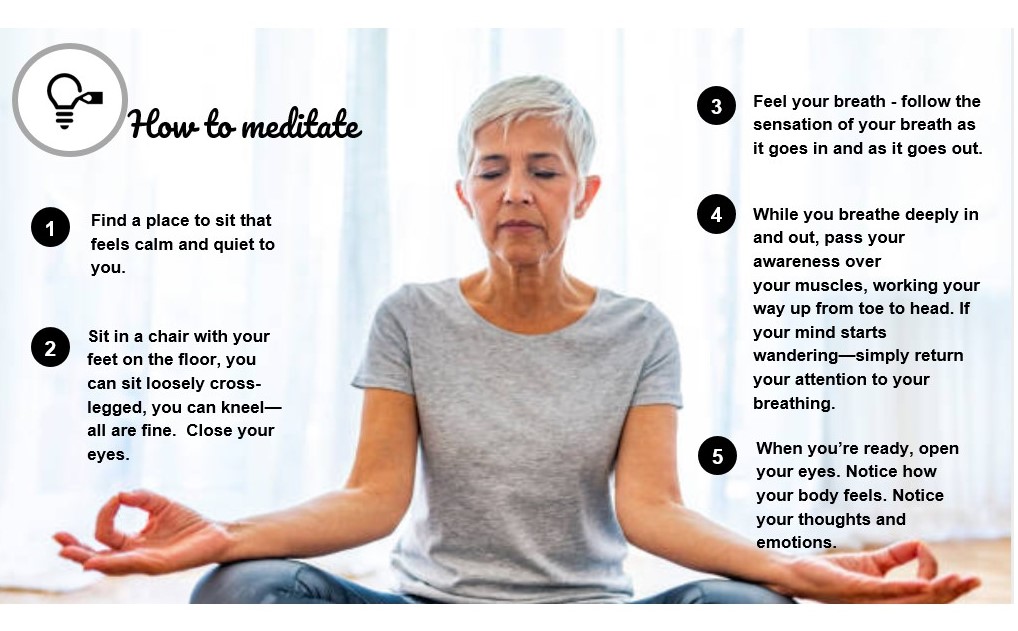
There is no question that the holiday season will look a little different this year. Many people will be missing their family and friends, while others are dealing with stress related to financial hardship or other challenges brought on by COVID-19. But here’s the silver lining: ‘Tis the season to create new, healthy routines and traditions. (Plus, think of some of the normal holiday stressors you get to leave behind this year – like long travel, traffic, shopping crowds and endless to-do lists!)
Here are 5 ways to find joy and stay connected while keeping stress at bay.
1. Be Kind to Yourself
Dulce Dagda, Wider Circle group facilitator and nutritionist, reminds us that it’s important to take a moment to realize we’re all in a difficult situation, experiencing our own stress and anxiety: “We can’t control the outcome of the pandemic and sometimes we don’t have control over our medical conditions. Be kind to yourself and let those things go.” As part of her weekly virtual check-in meetings with her senior neighborhood groups, Dulce has noticed how the simple act of talking with peers has helped those going through difficult times to cope and realize they aren’t alone in their hardships. “Talking with friends or neighbors of similar backgrounds can offer a tremendous source of support, wisdom and kindness for one another,” Dagda said.
2. Stay Connected with Technology
Remember that social distancing does not mean that you have to be alone. Connecting with neighbors, family and friends by phone or video chat, for instance, can help combat feelings of loneliness and improve overall well-being. There are many social media and video conferencing platforms, such as Zoom, FaceTime, Skype and WhatsApp. Choose the one you like best and select a time during the holidays to connect with everyone for a chat, board game or other festive activity. There’s no limit to connecting with friends and family once you find your favorite tech tool!
3. Channel Your Inner Zen with Relaxation and Meditation
Meditation has been shown to reduce pain and improve the body’s immune system, which makes it a perfect activity for this flu and COVID-19 season. As little as 5 minutes per day of focused relaxation can reduce feelings of stress and negative thoughts, increase energy and control blood flow.
Here are two simple methods that you can do anytime – all you need is a quiet space:
- Diaphragmatic (“belly”) breathing: This is that deep breathing where your stomach expands as you inhale and contracts back in when you exhale, maximizing your oxygen intake to help slow down your breathing, your heart, and your thoughts, as well as relax your muscles and improve your mood. Just a few slow breaths can help set the stage for a calm day or restful night.
- Body scanning: Pair this one with your deep breathing exercises. Start at your toes and bring your awareness up your legs, torso, arms and hands, shoulders and back, neck, and head. While you take your breaths, pass your awareness over those muscles and if they are tense, feel them relax. In just a couple of minutes, this can help you prepare to let go of the day.

4. Create a Daily Routine of Fun Activities
Make time for YOU. Scheduling these activities into your daily routine gives you something to look forward to, and keep your mind and body in tip-top shape.
- Get out in the garden: Start a small planter box with a few no-fuss herbs that you love to cook with – like basil or cilantro – and add to it over time.
- Cook up some new recipes: Schedule a virtual baking party with a few friends. Or package up some healthy holiday treats for neighbors in need.
- Organize your closet: Having a clean space makes for a clearer mind. If you tackle one section at a time, you’ll feel less stress about that mess.
- Get your game on: Online games not only help you stay connected with others; research tells us they can keep our minds sharp and bring daily doses of joy during especially stressful times. From mahjongg to memory games, check out our list of favorite free online games.
5. Exercise Every Day; No Gym Required
According to Dr. John Ratey, a practicing psychiatrist, clinical associate professor of psychiatry at Harvard Medical School, and founder of the Sparking Life organization, getting your heart rate up not only eases muscle tension, it also changes brain chemistry, increasing the availability of important anti-anxiety neurochemicals. “If you’ve been feeling down and you start to exercise and feel better, the sense that you’re going to be OK and that you can count on yourself shifts your entire attitude. The stability of the routine alone can dramatically improve your mood,” Dr. Ratey said.
Exercise has also been shown to balance blood sugar, and increase immunity by enhancing antioxidant levels in your body. Try to get at least 30 minutes per day. The time will fly if you make it fun and doable for your fitness level. Check out YouTube for tons of free exercise classes you can stream from the comfort of your home — from seated chair routines to Samba dance parties.
________________


